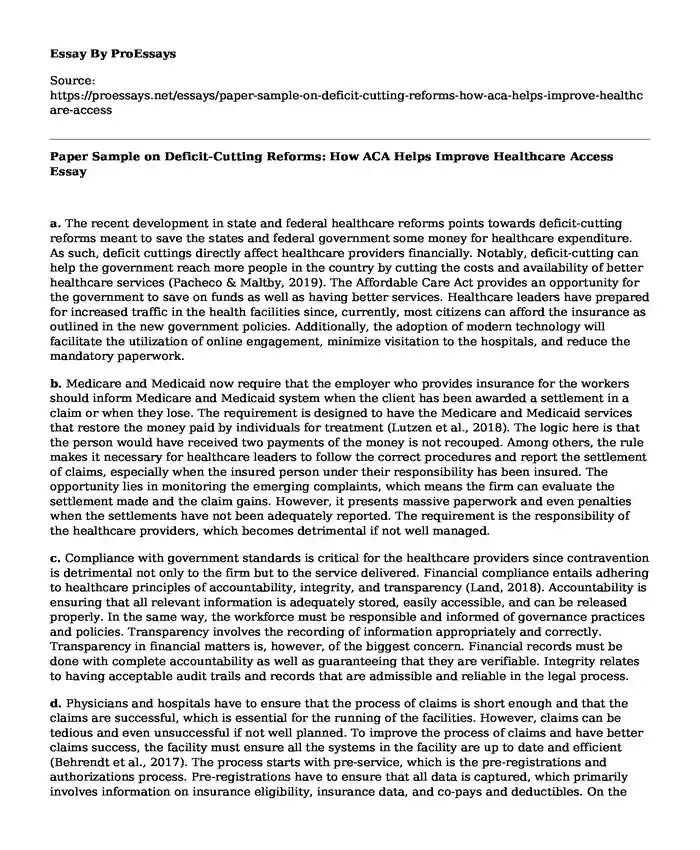a. The recent development in state and federal healthcare reforms points towards deficit-cutting reforms meant to save the states and federal government some money for healthcare expenditure. As such, deficit cuttings directly affect healthcare providers financially. Notably, deficit-cutting can help the government reach more people in the country by cutting the costs and availability of better healthcare services (Pacheco & Maltby, 2019). The Affordable Care Act provides an opportunity for the government to save on funds as well as having better services. Healthcare leaders have prepared for increased traffic in the health facilities since, currently, most citizens can afford the insurance as outlined in the new government policies. Additionally, the adoption of modern technology will facilitate the utilization of online engagement, minimize visitation to the hospitals, and reduce the mandatory paperwork.
b. Medicare and Medicaid now require that the employer who provides insurance for the workers should inform Medicare and Medicaid system when the client has been awarded a settlement in a claim or when they lose. The requirement is designed to have the Medicare and Medicaid services that restore the money paid by individuals for treatment (Lutzen et al., 2018). The logic here is that the person would have received two payments of the money is not recouped. Among others, the rule makes it necessary for healthcare leaders to follow the correct procedures and report the settlement of claims, especially when the insured person under their responsibility has been insured. The opportunity lies in monitoring the emerging complaints, which means the firm can evaluate the settlement made and the claim gains. However, it presents massive paperwork and even penalties when the settlements have not been adequately reported. The requirement is the responsibility of the healthcare providers, which becomes detrimental if not well managed.
c. Compliance with government standards is critical for the healthcare providers since contravention is detrimental not only to the firm but to the service delivered. Financial compliance entails adhering to healthcare principles of accountability, integrity, and transparency (Land, 2018). Accountability is ensuring that all relevant information is adequately stored, easily accessible, and can be released properly. In the same way, the workforce must be responsible and informed of governance practices and policies. Transparency involves the recording of information appropriately and correctly. Transparency in financial matters is, however, of the biggest concern. Financial records must be done with complete accountability as well as guaranteeing that they are verifiable. Integrity relates to having acceptable audit trails and records that are admissible and reliable in the legal process.
d. Physicians and hospitals have to ensure that the process of claims is short enough and that the claims are successful, which is essential for the running of the facilities. However, claims can be tedious and even unsuccessful if not well planned. To improve the process of claims and have better claims success, the facility must ensure all the systems in the facility are up to date and efficient (Behrendt et al., 2017). The process starts with pre-service, which is the pre-registrations and authorizations process. Pre-registrations have to ensure that all data is captured, which primarily involves information on insurance eligibility, insurance data, and co-pays and deductibles. On the provider part, the charges have to be captured correctly with timely documentation. On the clinical staff part, they have to ensure that consent and waiver are given before service. The management then communicates effectively to all stakeholders to monitor the service delivery. Finally, the backend staff can present claims as early as possible, as well as speedy feedback.
References
Behrendt, C. A., Heidemann, F., Rieß, H. C., Stoberock, K., & Debus, S. E. (2017). Registry and health insurance claims data in vascular research and quality improvement. Vasa, 46(1), 11-15.
Land, T. (2018). Legal and Compliance Issues in the Dynamic Context of Healthcare Today.
Lutzen, R. E., Nauman, G., Weis, D. G., Kennedy, B., & Bartlett, R. (2018). U.S. Patent No. 9,898,581. Washington, DC: U.S. Patent and Trademark Office.
Pacheco, J., & Maltby, E. (2019). Trends in State-Level Opinions toward the Affordable Care Act. Journal of health politics, policy, and law, 44(5), 737-764.
Cite this page
Paper Sample on Deficit-Cutting Reforms: How ACA Helps Improve Healthcare Access. (2023, Oct 21). Retrieved from https://proessays.net/essays/paper-sample-on-deficit-cutting-reforms-how-aca-helps-improve-healthcare-access
If you are the original author of this essay and no longer wish to have it published on the ProEssays website, please click below to request its removal:
- Palliative Sedation Essay Example
- Nurse Practitioners' Impact on Post-Surgery Quality Care - Essay Sample
- A Childhood Dream Fulfilled: Essay Sample on My Journey to Becoming a Nurse
- DACA Program in Jeopardy After Trump Election - Essay Sample
- Paper Example on Mild Hypothermia to Prevent Brain Damage After Cardiac Arrest
- Essay Sample on Beijing in Splendor: Examining the Physical Structure of a City
- Paper Example on Exploring Stigma Impacts on Adolescents' Self and Relationships







